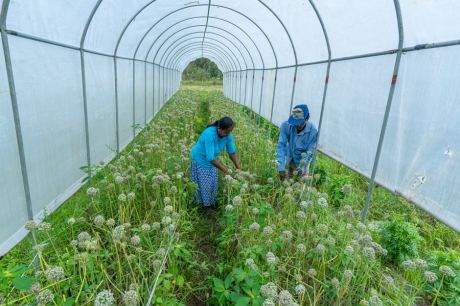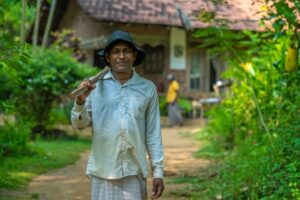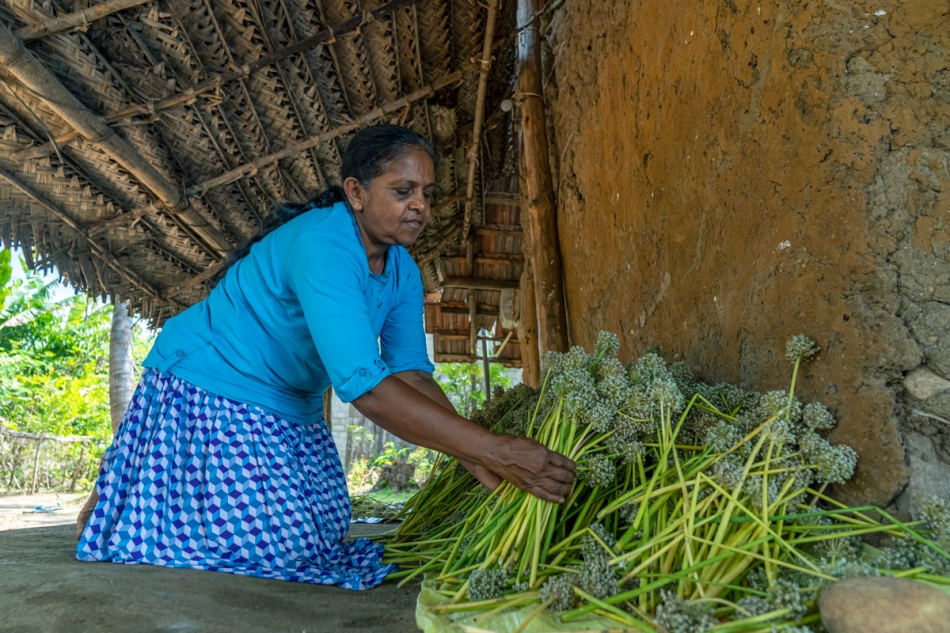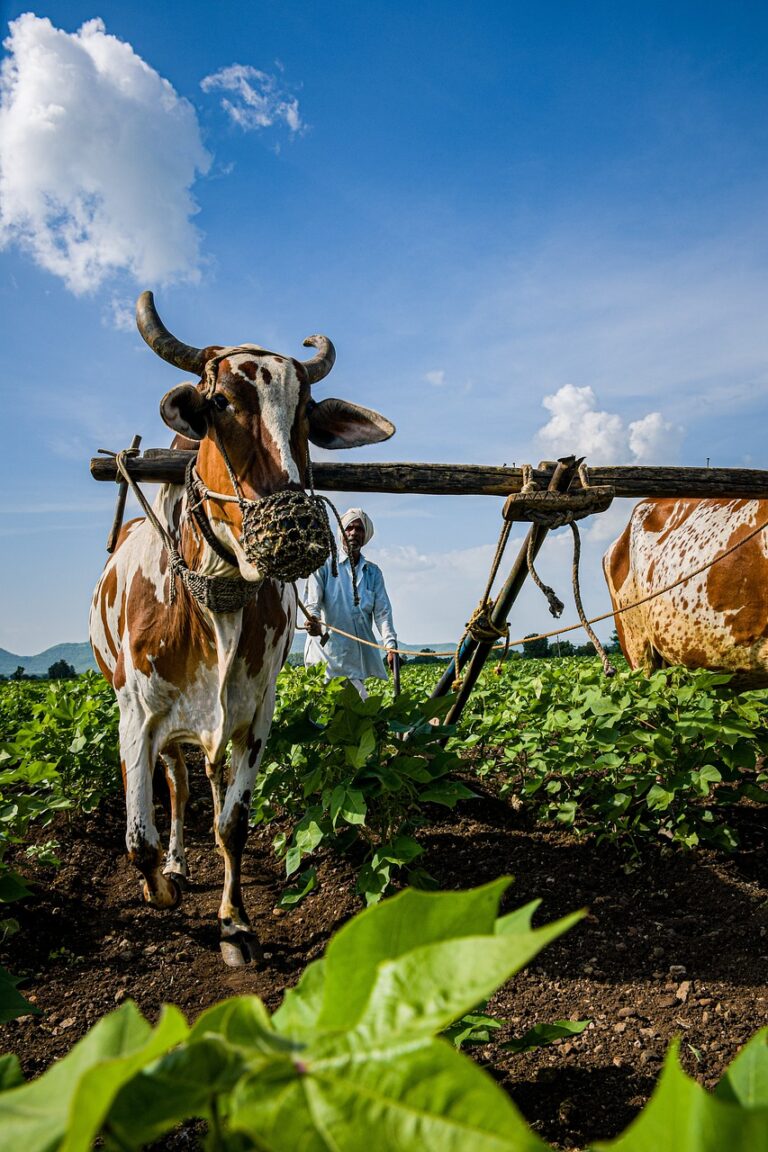
©FAO/Ravindra Rohana
In his 30 years as a farmer, Illeperuma Arachchilage Rathnayake, or Rathnayake as he’s known in his village, struggled to unlock the full potential of his onion seed cultivation. He began cultivating this crop as a 22-year-old with no official training but relied on lessons and cues from other farmers in his area.

Lacking the resources and proper equipment to protect his crops, Rathnayake used bamboo trees and polythene sheets as makeshift shelters. But these structures could not withstand heavy rains and wind, often blowing away and leaving his crops exposed to the elements.
This unpredictable weather and excessive rains, in particular, have been the latest in a series of challenges for the farmers in the rural village of Kalugala, nestled in Sri Lanka’s northern Anuradhapura district.
“Although I have cultivated onions for many years, I was unable to achieve the harvest I desired due to various challenges, particularly the lack of proper rain shelters,” describes Rathnayake.
As the sole breadwinner for his family, Rathnayake’s income from farming not only sustains his household but also supports his children’s education. Despite his determination, low yields and financial hardships often left him contemplating abandoning onion cultivation altogether.
An innovative project by the Food and Agriculture Organization of the United Nations (FAO), with funding from the government of Canada, rekindled Rathnayake’s hope in his agricultural endeavours.
FAO supported Rathnayake and 91 other smallholder farmers in producing high-quality seeds for improved onion and chilli production, providing the necessary training and equipment. Seeds on their own can often make the difference between low and high yields. Starting with high-quality seeds already sets farmers out for success.
Farmers in the northern, north-central and central provinces, who were engaged in traditional seed production methods, were selected to receive extensive training on how to adopt innovative technologies such as protected houses, polytunnels, rain shelters and micro-irrigation systems.
These advancements strengthened their crop management practices, providing a shield against pests and rain damage while maximizing water and fertilizer efficiency and reducing the need for chemical pesticides and weedicides. As a result, the seed cultivation thrived and the farmers’ yields soared.
Rathnayake explains, “In the past, we used makeshift rain shelters. They would often fail during heavy rains, resulting in losses as our seed nurseries got spoiled. I used to harvest around 2-3 kilograms of onion seeds but thanks to the new, high-quality rain shelters provided through the project, we are now expecting to harvest an impressive 12-15 kilograms of seeds per season.”
Now that his cultivation is yielding better results, Rathnayake is able to save and plan for the future. “My wife and I discussed how we should use the increased profits and we both agree that we should invest the profit back into our farm and expand the amount of onion bulbs we cultivate next season. This way we can steadily grow our farm and maybe even save enough to buy a second rain shelter ourselves.”

Malani Senehelatha, a 55-year-old farmer from Kalugala village who also took part in the project, comments, “Once I participated in the training, I realized that I was not following the perfect method in seeding big onions. Thanks to the seed production training, I now feel confident in making my onion cultivation profitable. The rain shelter provided to me is an immense support.”
The project worked with 92 women and men farmers and established seventeen rain shelters and five polytunnels across four districts, namely Jaffna, Killinochchi, Anuradhapura and Kandy. Sri Lanka’s Department of Agriculture is also using the farms supported by the project as demonstration sites to train more farmers on adopting innovative technologies, thereby ensuring the knowledge and innovative methods introduced by FAO continue beyond the project.
By empowering farmers with knowledge and equipping them with the necessary tools, FAO said it is enhancing Sri Lanka’s vegetable crop productivity while fostering sustainable farming practices and ensuring increased yields through higher efficiency of inputs and lower operational costs.
Source: the FAO News and Media office, Rome
– global bihari bureau






Pretty nice post. I simply stumbled upon your blog and wanted to say that I have truly enjoyed browsing your weblog posts. In any case I’ll be subscribing to your rss feed and I hope you write once more very soon!
I’ve recently started a blog, the information you offer on this website has helped me greatly. Thank you for all of your time & work.
you’re really a good webmaster. The web site loading speed is incredible. It seems that you are doing any unique trick. Also, The contents are masterpiece. you’ve done a wonderful job on this topic!
I discovered your blog post web site online and check a number of your early posts. Keep within the very good operate. I recently extra up your Rss to my MSN News Reader. Seeking forward to reading more by you afterwards!…
It’s rare for me to find something on the web that’s as entertaining and intriguing as what you have got here. Your page is sweet, your graphics are great, and what’s more, you use source that are relevant to what you’re saying. You are certainly one in a million, well done!
I am impressed with this internet site , rattling I am a big fan .
I’m impressed, I have to admit. Really rarely do you encounter a weblog that’s both educative and entertaining, and without a doubt, you might have hit the nail to the head. Your idea is outstanding; the problem is an element that not enough individuals are speaking intelligently about. My business is very happy that we stumbled across this within my look for something relating to this.
I have been meaning to write about something like this on my blog and this has given me an idea. Thanks.
I’d like to have more info on this subject, can I ask you the sources you used to write your post?
We refer you to Food and Agriculture Organization of the United Nations (FAO), Rome. You may contact them through their official website. – Editor
Very Curious site this is.. I really Relish a lot reading your Blog.. I will Bookmark your site for more remark.
I really love the way you discuss this kind of topic.’-;.’
Pretty nice post. I recently stumbled upon your blog and wished to state that I’ve actually appreciated searching your blog content. After all I will be registering to your own nourish and i also we imagine you compose once more quickly!
बहुत खुबसूरत और ज्ञानवर्धक है। समाज की दशा और दिशा स्वस्थ, स्वच्छ, और सम्पन्नता के लिए इस तरह के विचार अतिआवश्यक है। बिहार के कोशी सीमांचल में कई जटिल समस्या है जिस पर अगर समय रहते काम नही किया गया तो आने वाले कुछ सालों में गंभीर स्थिति उत्पन्न हो सकती है।।